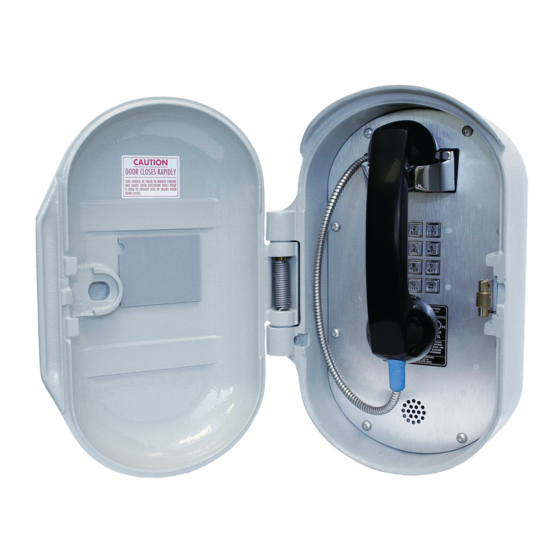GAI-Tronics 341-001 Manuel de l'utilisateur - Page 5
Parcourez en ligne ou téléchargez le pdf Manuel de l'utilisateur pour {nom_de_la_catégorie} GAI-Tronics 341-001. GAI-Tronics 341-001 16 pages. Div. 2 industrial telephones

M
226-002, 341-001,
ODEL
Installation
WARNING
This product can contain hazardous voltages. Always remove power to this
station and any associated equipment before beginning any installation.
CAUTION
Do not install this equipment in areas other than those indicated on the
approval listing in the "Specifications" section of this manual. Such installation may cause a safety
hazard and consequent injury or property damage.
Install equipment without modification and according to all applicable local and national electrical codes.
Consult the National Electrical Code (NFPA 70), Canadian Standards Association (CSA 22.1), and local
codes for specific requirements regarding your installation. Class 2 circuit wiring must be performed in
accordance with NEC 725.55.
Safety Guidelines
When installing any GAI-Tronics equipment, please adhere to the following guidelines to ensure the
safety of all personnel:
Do not install wiring during a lightning storm.
A Cat5 data line lightning surge protector is recommended for telephones subject to any electrostatic
discharge (e.g. lightning)
Do not install jacks in wet locations unless the jack is specifically designed for wet locations.
Security Hardware
The Model 226-002 is vandal-resistant, with the front panel attached to its enclosure with security screws.
A GAI-Tronics Model 233-001 Security Screwdriver or Torx T-25 security head tip (sold separately) is
recommended for installing the security screws. Models 341-001 and 351-001 Telephones' front panels
are attached with standard Phillips head screws.
Conduit Installation Details (applicable to Models 341-001 & 351-001)
GAI-Tronics recommends installing telephone lines in conduit to protect against accidental damage and
vandalism and to meet applicable Div. 2 installation requirements. To prevent moisture from entering the
enclosure, we strongly recommend the following:
Conduit should enter the enclosure from the bottom.
If entered from the top, the conduit must be internally sealed to prevent moisture ingress.
Sealed fittings should be installed at all cable entry points.
Silicone sealant or equivalent must be applied around and inside all conduit entries.
Please refer to Figure 1 and Figure 2.
e:\standard ioms - current release\42004 instr. manuals\42004-339f.doc
07/14
351-001 D
. 2 I
AND
IV
NDUSTRIAL
T
ELEPHONES
P
. 42004-339F
UB
4 of 14
P
AGE
